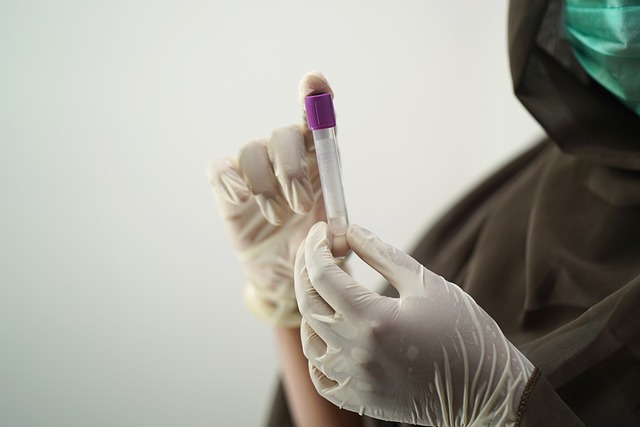The Standard Liver Blood Test (SLBT UK) is a key diagnostic tool for assessing liver health and cholesterol levels. This test measures critical liver enzymes like ALT and AST to detect liver damage or inflammation, as well as GGT and Bilirubin for potential liver conditions such as hepatitis or cirrhosis. Additionally, it includes a lipid profile that checks HDL ('good') cholesterol for its beneficial role in removing harmful cholesterol, and LDL ('bad') cholesterol to assess the risk of cardiovascular diseases. For individuals over 40 or those with cardiovascular risks, regular SLBT UK tests are essential for early detection and management of dyslipidaemia. Healthcare providers use NHS reference ranges to interpret these results, guiding patients towards targeted lifestyle changes or medical treatments if needed. Regular monitoring and understanding the test's comprehensive results are vital for maintaining optimal liver function and cardiovascular health, thus reducing potential health complications and supporting preventative healthcare strategies in the UK.
Understanding cholesterol levels is pivotal for maintaining cardiovascular health. In the UK, a Standard Liver Blood Test UK serves as a critical diagnostic tool, offering insights into both cholesterol and liver function. This article delves into the significance of blood tests in this context, guiding readers through the process of deciphering their results and what to anticipate from a standard liver test. By exploring each component of the test, we aim to empower individuals with the knowledge to make informed health decisions.
- Deciphering Cholesterol Levels: A Guide to Understanding Standard Liver Blood Test Results in the UK
- The Role of Blood Tests in Monitoring Cholesterol and Liver Health: What to Expect from a Standard Liver Blood Test UK
- Interpreting Your Blood Test Results: Comprehensive Insights into Cholesterol Levels and Liver Function Markers in the Context of the UK's Standard Liver Blood Test
Deciphering Cholesterol Levels: A Guide to Understanding Standard Liver Blood Test Results in the UK

In the United Kingdom, a Standard Liver Blood Test plays a pivotal role in assessing an individual’s liver health and understanding cholesterol levels within the body. This test includes measurements of five key components: alanine aminotransferase (ALT), aspartate aminotransferase (AST), gamma-glutamyl transferase (GGT), alkaline phosphatase (ALP), and total bilirubin. It also encompasses a comprehensive lipid profile, which provides insight into the individual’s cholesterol levels, including high-density lipoprotein (HDL) or ‘good’ cholesterol, low-density lipoprotein (LDL) or ‘bad’ cholesterol, and triglycerides. This profile is instrumental in diagnosing dyslipidaemia, a condition characterised by abnormal blood fats that can lead to increased risk of cardiovascular diseases. For individuals over 40 or those at higher cardiovascular risk, regular monitoring of cholesterol levels is recommended as part of the standard healthcare protocol. Understanding the results of these tests enables both healthcare providers and patients to tailor lifestyle changes and, if necessary, medication regimens to maintain optimal liver function and cardiovascular health, thereby reducing the likelihood of associated health issues.
When interpreting the results of a Standard Liver Blood Test in the UK, it is essential to consider the reference ranges specific to the National Health Service (NHS). For instance, total cholesterol levels should ideally be less than 5 mmol/L, with LDL cholesterol being less than 3 mmol/L for individuals without known cardiovascular disease or its risk factors. HDL cholesterol should be above 1 mmol/L, and triglyceride levels should be less than 1.7 mmol/L. Elevated GGT levels can indicate liver issues, while normal ALT and AST levels suggest a healthy liver. High ALP may indicate bone disorders or liver diseases. It is through this detailed analysis that healthcare professionals can effectively monitor overall health status and intervene when necessary to maintain optimal well-being.
The Role of Blood Tests in Monitoring Cholesterol and Liver Health: What to Expect from a Standard Liver Blood Test UK

A standard liver blood test in the UK plays a pivotal role in the early detection and monitoring of potential liver and cholesterol-related health issues. This test is a non-invasive procedure that provides valuable insights into the functioning of the liver and the levels of lipids, particularly cholesterol, within an individual’s bloodstream. The test typically includes measurements of liver enzymes such as Alanine Aminotransferase (ALT) and Aspartate Aminotransferase (AST), which can indicate liver inflammation or damage. Additionally, the test assesses the levels of Total Cholesterol, High-Density Lipoprotein (HDL) cholesterol, and Low-Density Lipoprotein (LDL) cholesterol. HDL is often referred to as ‘good’ cholesterol because it helps remove other forms of cholesterol from your bloodstream, while LDL is termed ‘bad’ cholesterol as high levels can increase the risk of heart disease and stroke.
For those undergoing a standard liver blood test in the UK, understanding what to expect is crucial. The process begins with a healthcare professional taking a blood sample from a vein in your arm, typically after you have fasted for a certain period. This sample is then sent to a laboratory for analysis. The results will provide a clear picture of your liver’s health and cholesterol levels, allowing for informed decisions about diet, lifestyle changes, or medical interventions if necessary. Regular monitoring through standard liver blood tests is essential for individuals with liver disease risk factors, such as excessive alcohol consumption, a history of viral hepatitis, or those with high cholesterol due to genetic predisposition or poor dietary habits. By identifying abnormalities early, healthcare providers can implement effective treatment plans and prevent potential complications.
Interpreting Your Blood Test Results: Comprehensive Insights into Cholesterol Levels and Liver Function Markers in the Context of the UK's Standard Liver Blood Test

When interpreting your blood test results for cholesterol levels and liver function markers within the context of the UK’s Standard Liver Blood Test, understanding the normal ranges and what they indicate is crucial. The Standard Liver Blood Test UK typically includes measurements of liver enzymes such as Alanine Transaminase (ALT) and Aspartate Transaminase (AST), which reflect the health of your liver by indicating whether there is any damage or inflammation. Elevated levels of these enzymes can suggest liver issues, prompting further investigation. Additionally, the test may measure Gamma-Glutamyl Transferase (GGT), Alkaline Phosphatase (ALP), and Bilirubin to assess liver function and detect potential disorders like hepatitis or cirrhosis.
Cholesterol levels are another vital aspect of a comprehensive health profile. The UK’s Standard Liver Blood Test does not directly measure cholesterol, but abnormal lipid profiles can be indicative of underlying liver conditions or the risk of cardiovascular diseases. Total cholesterol, low-density lipoprotein (LDL) cholesterol, high-density lipoprotein (HDL) cholesterol, and triglycerides are all components that should be within healthy ranges. High LDL cholesterol can lead to plaque buildup in arteries, increasing the risk of heart attack or stroke, while HDL cholesterol plays a protective role by removing excess cholesterol from the arteries. In the event of abnormal results, it is imperative to consult with healthcare professionals for personalised advice and tailored management plans, as they can provide comprehensive insights into the implications of your blood test results and suggest lifestyle modifications or medical interventions as necessary.
In concluding our exploration of cholesterol level testing via blood tests, it is evident that the Standard Liver Blood Test UK plays a pivotal role in safeguarding one’s cardiovascular and liver health. By providing clear insights into lipid profiles and liver function markers, individuals can make informed decisions about their dietary habits and lifestyle choices to maintain optimal health. Regular monitoring through these tests allows for early detection and management of potential issues, emphasising the importance of understanding and interpreting your results within the UK context. Healthcare professionals can then tailor personalised healthcare strategies, ensuring proactive management of cholesterol levels and liver function. With this knowledge at hand, individuals are empowered to take charge of their health, aiding in the prevention and treatment of conditions that affect millions in the UK.
